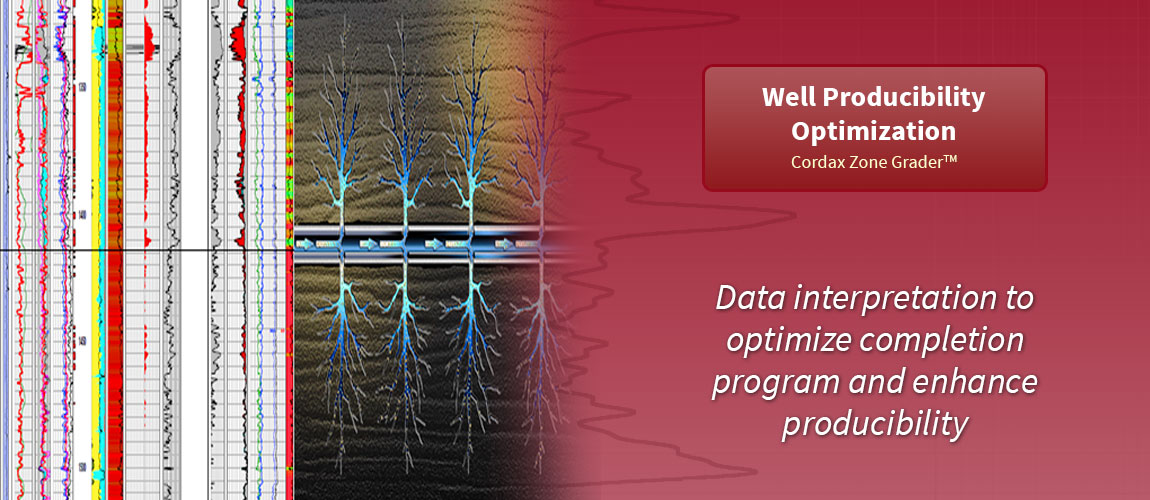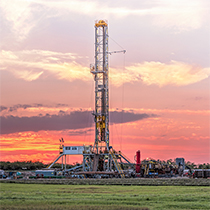Completions
Do you have enough formation information to plan your completion and tailor your stimulation?
Our Solution
With the proliferation of unconventional and horizontal resource drilling, optimizing production has become has become progressively more challenging for operators. Openhole log data is a key component in a successful completions strategy as it facilitates the understanding of important reservoir characteristics such as:
variability and composition of reservoir in lateral well bores
petrophysical and geomechanical properties of reservoir rock
complex geology effects on well completions
effects of clays on completion and stimulation
Our Solution (Continued)
Pre-set geometric completions and stimulation designs do not factor in these critical well characteristics. Logging While TrippingTM (LWTTM) services, when combined with Zone GraderTM analysis and interpretation allow you to make informed completion decisions using real openhole data and enhance the producibility of your reservoir. By understanding the petrophysical and mechanical properties of your well a customized completion can be developed to tailor your stimulation program and save costs. This fine tuning of each stage and frack cluster improves effectiveness and saves costs by right-sizing your completion budget. Don't settle for after-the-fact cased hole logs or derived well information from non-logging measurements or offset wells.
Operationally, the safe and economic acquisition of openhole logs is as critical as the data itself. Cordax Evaluation Technologies provides formation evaluation solutions using the Logging While Tripping (LWT) platform. This patented logging technique allows memory based openhole logs to be acquired in a method that is more cost effective, uses less rig time, and has fewer inherent risks than wireline, shuttle (thru-the-bit), or logging-while-drilling (LWD) methods. LWT enables openhole logs to be acquired in vertical, deviated, horizontal and tough logging condition wells where logging was previously considered too risky or too expensive
The real cost of openhole logging is the incremental rig time used in conveyance and acquisition. LWT acquires wireline quality data while essentially eliminating this considerable expense and mitigating operational risk.
* Petrophyscial and Geomechanical log display of unconventional shale well based on triple combo inputs curtesy of NUTECH
'Hundreds of new-generation production logs have been run in geometrically completed unconventional wells. Analyzing these logs indicates that 15-20% of the fracture stages and 35-40% of the perforation clusters do not contribute to production.'
~ The American Oil and Gas Reporter
Resource Downloads
See how Cordax adds value to your colleagues…
Openhole logs allowing full petrophysical interpretation in all well geometries
Risk free openhole logs without impact on drilling operations or extra rig time.
Optimize production and accurately book reserves
Explore Cordax well optimization benefits…
Application
Formation Evaluation method replacing wireline, LWT, TBL, and pipe conveyed OH logging methods
Benefits
Wireline quality petrophysical data acquired during routine trip out of well
Eliminates bridging and lost-in-hole (LIH) exposure versus other methods
No extra pipe trip or hole conditioning
Data acquisition in any well trajectory
Tools pumped into BHA only when required, reducing wear and risk
Application
Casing point detection
Evaluate Multi Laterals
Kick-off point detection in build section
Benefits
Deployment at any point during drilling operations
Virtually invisible to drilling and well construction activities
Rig time savings by reducing extra trips
Allows timely completion decisions
Incorporates well data such as mud logs, gas, ROP, pore pressure
Application
Frack strategy optimization
Completion design optimization
Optimal zone selection
Benefits
Accurately locate and plan frack stages incorporating well parameters with LWT acquired Neutron, Density, Resistivity and Spectral Gamma Ray
Providing the physical property data necessary for production optimization
Compete geological model and update reserve calculation in resource plays












